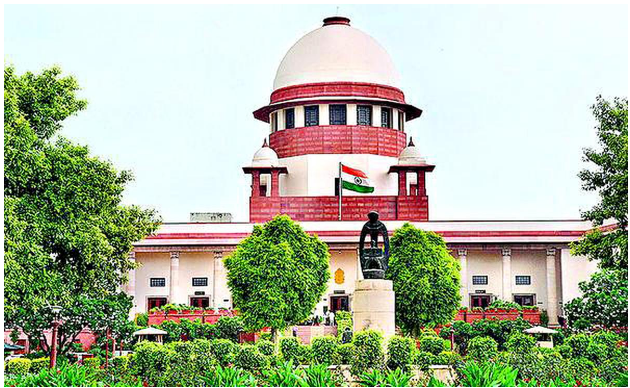Context:
The episode of the collegium’s recommendation of Justice L. Victoria Gowri’s name and her appointment to the Madras High Court within weeks, has revived the debate on judicial appointments.

Image Source: The Hindu
Concern about the Ideological/Political Leanings of Judges:
- The Supreme Court of India is a political court in the sense that it is the final arbiter of political disputes.
- Accordingly, the political and ideological positions of judges may influence their judgments — at least on contentious political questions.
- “It is a centre of political power because it can influence the agenda of political action, control over which is what power politics is in reality all about,” wrote philosopher jurist Upendra Baxi.
- The Court is routinely drawn into the politics of the establishment as well as the politics of the Opposition.
- Whether justices of the Court like it or not, the court can be used for purely party political ends in certain situations beyond the control of the Court.
Evidence as judgments and appointments:
- The Hindutva judgement (1996) was a big boost and legitimised the Bharatiya Janata Party (BJP)’s ideological position.
- ADM Jabalpur (1976) verdict gave a boost to the Indira Gandhi government.
- S.R. Bommai (1994) that had upheld the dismissal of the BJP governments in Madhya Pradesh, Rajasthan and Himachal Pradesh after the demolition of the Babri Masjid, on the ground of secularism as the basic structure, was a big victory for the Congress.
- The Rafale verdict in 2018 which came before the general election in 2019 was a big political boost for the Narendra Modi government.
- The final judgment in the Ayodhya case (2019) too had huge political significance.
- The upholding of reservation for the economically weaker sections reservation (2022) amendment, and on demonetisation (2023) spelt major political victories for the BJP government.
- The ongoing Shiv Sena case too has political implications.
- At the same time, several politically sensitive cases have not yet been heard such as challenges to the electoral bonds scheme, the Citizenship (Amendment) Act, and the dilution of Article 370.
- Public Interest Litigation, on changing names of over a 1,000 places, a uniform divorce law, anti conversion laws, love jihad, and women’s entry in mosques are examples of the use of the court for political purposes.
Consideration of the ideological leanings of judges during appointment:
- Government, in 1973, defended the appointment of the CJI ( Justice A.N. Ray who had superseded three senior most judges) by talking on more suitable relationship between the court and the government, basic outlook, his attitude to life and his politics.
- The left leading Justice V.R. Krishna Iyer was a Minister in the communist government in Kerala.
- Justice Baharul Islam was an elected member of the Rajya Sabha representing the Congress.
- Justice Guman Mal Lodha had rightist leanings and subsequently thrice won the Lok Sabha election on the BJP ticket.
- Justice K.S. Hegde even became Speaker in the Janata government.
- Justice Vijay Bahuguna was Chief Minister of Uttarakhand.
Independent status of Judiciary:
Many government appointed judges were able to assert their independence; barring a few exceptions, they have been quite impressive.
- Some even struck down major decisions taken by the Jawaharlal Nehru and Indira Gandhi governments.
- In Champakam Dorairajan (1951), the reservation policy of Madras was struck down by the majority of 7:0.
- In I.C. Golaknath (1967), the Supreme Court denied Parliament the power to amend the Constitution and held fundamental rights to be the primordial rights necessary for the development of the human personality.
- In R.C. Cooper (1970), the top court (10:1) struck down the historic bank nationalisation decision; in Maharajadhiraja Madhav Rao Scindia (1971), abolition of privy purses was also struck down by a 9:2 majority.
- In Kesavananda Bharati (1973), the basic structure theory was propounded to restrict and limit Parliament’s power to amend the Constitution.
- In the Raj Narain case(1975), Justice Jagmohan Lal Sinha had struck down the Prime Minister’s election.
- Even during the Emergency, as many as nine High Courts had upheld the right to habeas corpus against illegal detention.
- Such strong judgments are rarely delivered today.
Reform needed in the Collegium:
- The collegium system has not drastically improved the situation as the government continues to have the final word in the judicial appointments.
- Since the government does have a veto power in practice in spite of the Memorandum of Procedure laying down that the government would be bound to appoint a judge if his/her name is reiterated by the collegium, it is better to include the Union Law Minister in the collegium (just as in several other countries) so that his views are heard and his reservations discussed threadbare.
- If the other five judges (CJI plus four judges) are not convinced, decisions can be made by the majority, and the government being party to the deliberations and recommendations would have to accept collegium’s recommendations.
- The goal should be to end the supersession, cherry picking of judges and making the process more transparent.
News Source: The Hindu
![]() 2 Mar 2023
2 Mar 2023
